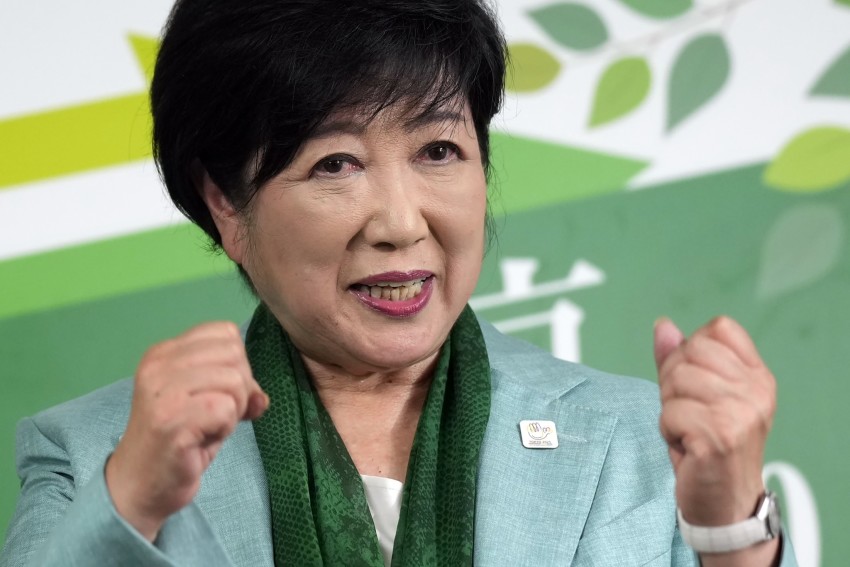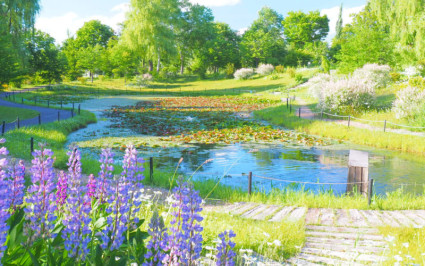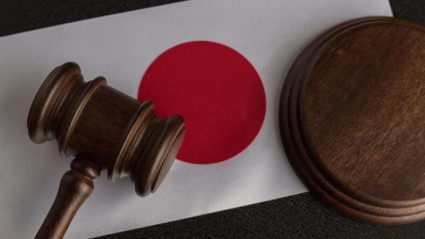Eight years ago, Yuriko Koike became the first woman to lead Tokyo, beating her male predecessor. She won her third term as governor Sunday, and one of her closest rivals was a woman.
Multiple women competing for a top political office is still rare in Japan, which has a terrible global gender-equality ranking, but Koike’s win highlights a gradual rise in powerful female officials and a society more open to gender balance in politics. That said, even if a woman eventually becomes prime minister, politics here is still overwhelmingly dominated by men, and experts see a huge effort needed for equal representation.
“There are growing expectations for women to play a greater role in politics,” said parliamentarian Chinami Nishimura, a senior official with the main opposition Constitutional Democratic Party of Japan. “In politics or parliament, which are still largely considered men’s work, it is extremely meaningful for women to show their presence and have our voices heard.”
Nishimura, who also heads the opposition party’s gender-equality promotion team, hopes to have women make up 30% of her party's candidates in the next national election. Prime Minister Fumio Kishida’s conservative Liberal Democratic Party last year vowed to achieve 30% female representation within 10 years, and is working to recruit more female candidates.
Finding aspiring female candidates, however, isn't easy. Women in Japan are still often expected to be in charge of childrearing, elderly care and other family responsibilities.
National parliamentarians are also expected to regularly travel between Tokyo and their home constituencies, which makes it especially difficult for female lawmakers trying to balance a career and family. Nishimura says former female colleagues have quit national politics and returned to local assemblies because of such demands.
Nishimura began her political career in her hometown Niigata's prefectural assembly in 1999, the first woman to serve there in decades. The 53-member assembly now has five women.
A growing number of women are now seeking political careers, but they are still in the minority, especially in national politics where electoral decisions are largely determined by closed-door, male-dominated party politics, and outspoken women tend to be targets.
One of Koike’s top rivals was a woman, Renho, a veteran former parliamentarian who goes by one name and who finished third. Renho told reporters last month that she often saw headlines about the Tokyo governor's race that trumpeted “A battle of dragon women.” “Would you use that kind of expression to describe a competition between male candidates?” she asked.
Koike, a stylish, media-savvy former television newscaster, was first elected to parliament in 1992 at age 40. She served in a number of key Cabinet posts, including as environment minister and defense chief, for the long-ruling Liberal Democratic Party, before becoming Tokyo governor in 2016.
Renho, known for asking sharp questions in parliament, was born to a Japanese mother and Taiwanese father. A former model and newscaster, she was elected to parliament in 2004 and served as administrative reform minister in the government led by the now-defunct Democratic Party of Japan.
Attacks on Renho's aggressive image were a clear example of gender bias in a society that expects female candidates to be “motherly or cute," said Chiyako Sato, a Mainichi Shimbun editorial writer and a commentator on politics.
Because of a small female presence in politics, powerful women tend to get excessive attention. Their presence in Tokyo governor’s election “conveyed a positive message that women can become political leaders, but a large amount of the noise about them also reflected Japan’s sad reality,” said Mari Miura, a Sophia University professor and expert on gender and politics.
For instance, a survey of national and local lawmakers in 2022 conducted by a civil group showed one-third of about 100 female respondents faced sexual harassment during election campaigns or at work.
Earlier this year, a gaffe-prone former prime minister, Taro Aso, was forced to apologize for describing Foreign Minister Yoko Kamikawa, a woman, as capable but not beautiful.
Women make up about 30% of the Tokyo assembly, and their presence in town assemblies in urban areas is also growing. On average, female representation in more than 1,740 Japanese local assemblies doubled to 14.5% in 2021 from 20 years ago. There are growing calls for more female voices in politics.
But in rural areas, where more traditional gender roles are more usual, 226, or 13% of the total, had “zero women” assemblies last year, according to the Gender Equality Bureau of the Cabinet Office.
In parliament, where conservative Liberal Democrats have been in power almost uninterruptedly since the end of World War II, female representation in the lower house is 10.3%, putting Japan 163rd among 190 countries, according to a report by the Geneva-based Inter-Parliamentary Union in April.
In 1946, the figure wasn't much different — only 8.4% — when a first group of 39 women were elected to parliament, according to the Gender Equality Bureau.
“There have been changes starting from regional politics, but the pace is too slow," Sato said, proposing a mandatory quota for women.
One woman in a Cabinet of about 20 ministers was standard in the 1990s. Lately, two is usual. Maintaining an increased number of female ministers is a challenge because of a shortage of women with seniority. Women are also given limited leadership chances, which delays gender equality laws and policies.
“Because of the absence of leadership change, the metabolism is bad in Japan. Because of that, politics does not change despite changes in the public view,” Miura said.
Koike became the first female candidate to run in the LDP leadership race in 2008. Two others, Sanae Takaichi and Seiko Noda, ran in 2021 against Kishida.
Most recently, Kamikawa, the foreign minister, is seen as having a chance, because the LDP wants change as it struggles with dwindling support ratings and corruption scandals.
The winner, determined by a vote among LDP lawmakers and party members, automatically becomes prime minister because of the LDP’s dominance in parliament.
Under the Japanese system, however, having a female prime minister doesn't necessarily mean progress in gender equality because of overwhelming male political influence. But it could be a crucial step forward, even if symbolic, said Sato, the political commentator.
“Having role models is very important ... to show gender equality and that women can also aim for a top job," Sato said. “Women in politics are no longer expected to be wallflowers.”
© Copyright 2024 The Associated Press. All rights reserved. This material may not be published, broadcast, rewritten or redistributed without permission.














34 Comments
PTownsend
The seniority system keeps Japan from making better progress, but then 'progress' is a negative concept to too many, including those with the greatest wealth, many with familial ties to money and political power.
TokyoLiving
Their country, their rules..
bass4funk
Not when it’s to the downfall and detriment to advancement of the entire nation
Lindsay
The eight years in office have aged her by at least twenty years. Perhaps is not the prejudice that is keeping women out of politics. Perhaps it is the grueling schedule and responsibilities that keeping them away.
Peter Neil
basing a choice on genitalia is no better than basing a choice on height.
Peter Neil
how many women ran for office in last nationwide election?
how many won?
a fair questions. anyone know?
writing without information is like writing fiction.
itsonlyrocknroll
Gender?
Tokyo Gov. Yuriko Koike is a carbon copy of every senior LDP ruling government politician.
Without any policy that will change the course of continuing depopulation, economic reform or restructuring programme.
Mediocrity, the lack of innovation in government, is matched by an ageing population, a lack of affordable childcare, family assistance to kick start family planning, it like watching slow tragic decline.
Right here is the latest down turn through a failure of government, of leadership, stagnation.
Japan real wages down 1.4% in May, 26th monthly fall despite hikes
https://japantoday.com/category/business/update2-japan-real-wages-down-1.4-in-may-26th-monthly-fall-despite-hikes
Wandora
Yes, go out and press-gang women into the government and see where that leads.
Bellflower
”Finding aspiring female candidates, however, isn't easy”
This Associated Press story is obviously contradicted by the Tokyo election it tries to peg the article on, in which there were two prominent female choices. The Japanese Communist Party runs many female candidates, but they won't get any praise from the American AP news agency.
The article complains about the "slow pace" of gender equality wanting more female candidates elected... but could not care less about what their actual political programs are. The article is not interested in social and economic progress, only window dressing for the status quo.
Peter Neil
it’s written by mari yamaguchi, who forgot to add, “some scientists say that…”
zulander
But there are not growing expectations for, for example, the construction industry.....
Why might that be? Arent we being told that we can all do the same jobs? Or is there only one particular type of job coveted...
GillislowTier
The number of female candidates will continue to be low too. They have no one to inspire them to get into politics or climb the ladder in the field. All they get is “you have to sacrifice everything and act like a man aka short hair and snappy 80s style power suits to run”
Not to mention take all verbal and physical abuse on the chin because this is politics and you gotta be tough! These old men in power would rather see the country burned to the ground than a woman in power. Heck look at the royal family. They fully would be ok with a female head, but the LDP refuses to let them do it for some reason. Going as far as researching if they can allow second and third cousins from families removed from the royal household instead of the direct kids of the emperor that are female lol.
Why would any woman put themselves through the LDP washing machine like this.
Wandora
As a point of reference, in the UK 'only' 35% of MPs are female. I guess that's still not enough to please some people. And no LDP there to blame. What could be another reason, that could perhaps be applied to Japan?
toolonggone
What’s that mean?
Shadows of the Rising Sun
I think you mean, 'their country, men's rules'
(^▽^)
caroti
It is actually just over 40% right now in the UK.
Rwanda: 61.3%
Cuba: 53.4%
Nicaragua: 50.6%
Mexico: 50%
United Arab Emirates: 50%
New Zealand: 48.3%
Sweden: 47%
South Africa: 46.6%
The US is only 28% but hardly a model of democracy.
it's not about 'pleasing;' someone; it's about gender equality and fair representation. You don't want that?
Many things; culture, history. This is not Google or chatGPT
Boki24
You need to take a Humanity 101 course bud
grund
As Bellflower said, there is a huge difference between the parties that this article doesn't mention. The Communist Party usualy have almost 50% female candidates, LDP 5-10% and Komeito has even less. So it might be unfair to describe it as a Japan problem when it might actually be a LDP problem.
robert maes
A politician is a politician. Male or female. Equally selfish and self-centred. She has made no difference in 8 years and the next 4 will make no difference.
the cozy seat has extinguished the initial little flame burning in her.
Wandora
There is already equality of opportunity. I do not want forced equality of outcome, no. Is that what you want? The latter is most definitely about pleasing certain people.
caroti
Well, if you mean pleasing the female population and those who support them, then yeah, I suppose you could say it's to 'please' certain people.
You are joking, right? Japan is ranked 118th for equality of opportunity for women.
Yes, women in Japan can go to school, but there is not full equality in higher education (some universities have been caught rejecting female applicants for entrance and research roles, etc.), the workplace, or politics.
owzer
What do we want?
POWER!
When do we want it?
NOW!!
Remember folks, if they Didn’t Earn It, then they should t be there - woman OR man.
virusrex
For this to hold any weight you need to make the assumption that women are inherently less capable than men, otherwise it would be expected for them to be represented in the same ratio as in the general population.
In short this only works in the mind of people that consider women inferior.
Raw Beer
Equality of opportunity is a good thing, but focusing on equality of outcome will only lead to problems.
Garthgoyle
@Margaret
Do you consider anyone with a different opinion than yours a racist troll?
That's not how debating works.
owzer
It's interesting that you inferred I was suggesting women are less capable than men. My original statement clearly applied to both women and men equally.
That said, men and women often have different skill sets and abilities in general, but this doesn't preclude individuals from excelling in areas typically dominated by the other gender.
virusrex
No it does not, because the context is the article that clearly talks about the rise of women in Japanese politics. If anything you are equalizing this situation to men that obtain a position without deserving it. Once again, the comment only makes sense by assuming the subject of the article is inferior to the standard.
And thinking that dominance in an area is explained by gender specific sets and abilities is a personal belief you have, not something that could be demonstrated to happen objectively for politics. As demonstrated by other countries the actual situation is that there is no gender specific difference that explain the inequalities in Japan (and other countries still trapped in previous centuries).
owzer
Virusrex, your ability to discern what others are unaware they know is truly remarkable. /s
You should know that I believe there should be more women in politics, not due to any lack of equal or appropriate representation, but because women often excel in the skills required for effective political leadership more than men do.
But my original position has not changed. DEI is not the solution. Meritocracy is.
Peter Neil
you get what you vote for.
Peter Neil
Boki24Today 01:44 pm JST
"You need to take a Humanity 101 course bud"
thanks, bud. but i'm already 10x smarter than you.
virusrex
When you make claims that can be demonstrated mistaken with evidence this is not something that requires any talent. Either you are unaware of something or pretending so because you have no argument against the reality.
Which again depends completely on assuming the people assuming positions lack the merits to do it, which is what you personally believe without any evidence of it being the case, and worse even with evidence that this is not the case.
When you assume everybody has the same potential there is no problem with aiming for positions to be filled in the same proportion as the composition of the general population, that is the expected result, saying that DEI opposes merits only make sense for people that think some people are naturally less capable so inequalities should be expected.
owzer
Nonsense. DEI takes into account things that have nothing to do with one's ability to do a job. Meritocracy considers their capabilities.
Do you want to hire someone because they like a particular flavor of ice cream? Or because he or she can actually do the job?
Ken
No it's just people echoing politicians and Musk. They choose someone who was qualified but also met other criteria like being a different race or different gender. But certain butthurt individuals have this on going propaganda of changing the script to say this person got hired only because they are different. Intentionally leaving out that they are qualified but also have potential to bring new/different viewpoints to the table.
owzer
I assure you it is not "just" that. It's more like seeing failed DEI hires again and again and again...